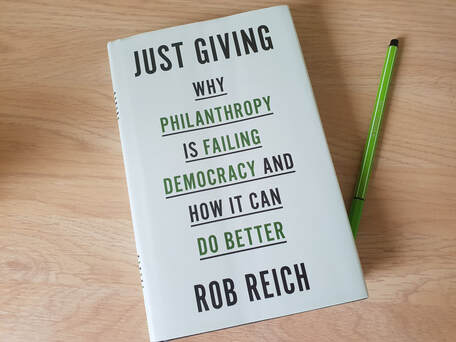MOVING BEYOND A NICE SENTIMENT - HOW CAN WE ACTUALLY CHANGE AND CHALLENGE PROBLEMATIC PHILANTHROPY?2/9/2020
Back in June, in response to the toppling of the statue of Edward Colston in Bristol and the Black Lives Matter movement, I shared some reflections on the issues facing philanthropy.
My argument in a nutshell was this: philanthropy is inextricably tied with extreme wealth, and most of that wealth is derived from activities that increase inequality. Philanthropy gives a particular audience – wealthy, privileged, mostly white, usually male – disproportionate influence over the sector’s work and policies, and an opportunity to implement a vision of social change that is likely very different from your own. This process is inadvertently endorsed every day by fundraisers and charities – so while Edward Colston is an extreme and high-profile case, there are other examples everywhere. I’m delighted that this blog sparked plenty of debate and discussion, but I’m conscious it offered little by way of solutions. The truth is, it’s very difficult for most fundraisers to take action, especially if their organisation isn’t geared up to question philanthropy. Several people rightly asked for some thoughts on what organisations can actually do differently, rather than just why it’s important. This is where things get trickier, and more controversial, but here are my views… Reduce your long-term dependence on philanthropy
Let’s deal with the elephant in the room. It’s all very well not wanting to accept certain donations - but in the current climate, for many, it’s not unreasonable to think that turning away a big gift could lead to service closures or staff redundancies.
I can’t pretend there’s a quick or easy answer to this. But we’ve previously shared various thoughts about diversifying your income, which will inevitably reduce your reliance on a single funder, donor or income stream, and make it easier to stick to your principles. This 2018 blog explores how to build a business case to persuade your organisation to invest in developing a more diverse fundraising portfolio. And in this podcast, I interview Fran Ferris-Ockwell, former CEO of a Sheffield housing charity, on how she guided them through a process to reduce their reliance on contract income, with huge improvements to their independence and organisational culture. Most organisations won’t be able to reduce their dependence on funders and major donors overnight, but these steps are a key starting point – particularly if you're brave enough to set an explicit long-term strategic objective to become less dependent on grants and major gifts over several years. Create a fit-for-purpose ethical fundraising policy
We previously shared six guiding principles about creating an ethical policy. While it might be tempting to find a policy template online and quickly adapt it, the most important part of this exercise is having an honest and meaningful conversation with your management team and trustees. You should develop guidelines that feel appropriate for your organisation, mission and service users. Don’t expect this to be an easy exercise, or for everyone to immediately agree, as you’re dealing with a complex issue.
Be aware that enforcing your policy to the letter might lead to both accepting or rejecting donations in controversial circumstances later. This could conceivably lead to negative press coverage, complaints from supporters, disagreements with staff and trustees, or having to close a service. You need to fully anticipate and ‘test’ the potential consequences of your policy, so you can confidently justify decisions later.
Empower your fundraisers and lead by example
After publishing our original blog in June, I was contacted by several fundraisers sharing experiences where they felt uncomfortable about the ethical implications of a donation or a donor’s behaviour, but felt unable to act. For example:
Your ‘front line’ fundraisers are likely to be younger, less experienced and less influential than your donor prospects, management and trustees. They may well be working under pressure, knowing that failing to hit financial targets could well harm the organisation’s financial health, staff livelihoods and service users. So even if a fundraiser feels uncomfortable about something, voicing this might feel daunting and detrimental to their career. Solving this actually goes beyond having an ethical fundraising policy, particularly one that sits in a drawer gathering dust. Your senior management and trustees need to lead by example by openly talking about the ethical issues with philanthropy, and creating opportunities for fundraisers to raise concerns and ask questions without fearing a backlash. Something else to consider: is your approach to setting fundraising targets and KPIs creating an environment where fundraisers feel pressured to stay silent and bring in donations at all costs? Unrealistic targets - particularly those based purely on the cost of your projects rather than sector benchmark data, are another potential barrier to thoughtful and ethical fundraising. Move beyond #donorlove
This feels controversial - when I suggested this on Twitter, I was met with some incredulous responses.
#donorlove is a popular term to describe a donor-centric approach to fundraising that focuses on making donors feel loved, valued and appreciated, to encourage and retain their support. This isn’t totally without merit - many organisations don’t do this, and miss out on donations as a result. I’ve previously shared my own experiences as a donor and why charities should get better at saying thank you. But too often, #donorlove crosses into advocating putting the donor’s wishes and the importance of building a relationship with them above other concerns. I’ve seen high-profile consultants advise charities to structure annual reports entirely around recognising the contributions and achievements of the donor, even if their service users fade into the background as a result.
I think you can make a case for #donorlove being incompatible with the need to re-examine philanthropy in response to recent events - and an inadvertent endorsement of hypocritical philanthropy, the problematic influence of wealthy donors and the white saviour complex. When fundraisers are faced with the pressure of a financial crisis, silence from their senior leadership, and influential fundraisers’ unswerving commitment to #donorlove, is it really any surprise that they feel unable to do things differently?
I doubt that #donorlove is going anywhere fast - too many high-profile fundraisers and consultants have structured their livelihoods around the concept - but perhaps we need to start taking the first steps. Challenge how we structure, incentivise and culturally revere philanthropy
Philanthropy is commonly considered an unselfish, freely-taken individual act that increases equality and is open to everyone. Cast in this light, what right do we have to challenge where that money comes from, or how it is used?
Unfortunately, this view of philanthropy is false. In his book “Just Giving: Why Philanthropy Is Failing Democracy and How It Can Do Better”, Rob Reich examines the philanthropic landscape in the US and reaches two uncomfortable conclusions. Firstly, less than a third of charitable giving actually benefits low-income people. Secondly, the US tax system is massively skewed towards rewarding and incentivising the wealthiest donors: if you earn under $153,100 per year then a $100 donation costs you $100, whereas it can cost a higher earner as little as $60. Admittedly the UK landscape is somewhat different, not least because we have a Gift Aid scheme rather than just tax breaks for the donor. But essentially, the same problem exists globally: the tax system greatly subsidises charitable giving and enables richer people to donate money at less personal cost. This actually takes money out of the public purse and redirects it towards causes favoured by the rich and powerful, which rarely benefit low-income people. Philanthropy therefore can actually harm rather than help equality.
Reframing philanthropy in this way completely changes our right and obligation to challenge it. For example, how much influence and recognition should a wealthy donor enjoy for their supposedly ‘selfless’ gift? Should we permit a family trust to be opaque about where its money comes from, and how it decides which causes to support? Why can’t we create and enforce a new code of ethics and transparency, and remove the huge tax breaks for funders and donors who won’t play ball?
In barely 100 years, we’ve gone from elite-level philanthropy being met with suspicion and fierce criticism - Rob Reich documents the angry response to John Rockefeller’s early attempts to establish his charitable foundation in the US in the early 1900s - to today’s almost unquestioning endorsement of philanthropy and #donorlove. In keeping with the positive response to the toppling of Edward Colston’s statue and the Black Lives Matter movement, I think we urgently need to start nudging back in the other direction.
2 Comments
|
Like this blog? If so then please...
Categories
All
Archive
May 2024
|
Lime Green Consulting is the trading name of Lime Green Consulting & Training Ltd (registered company number 12056332)




 RSS Feed
RSS Feed